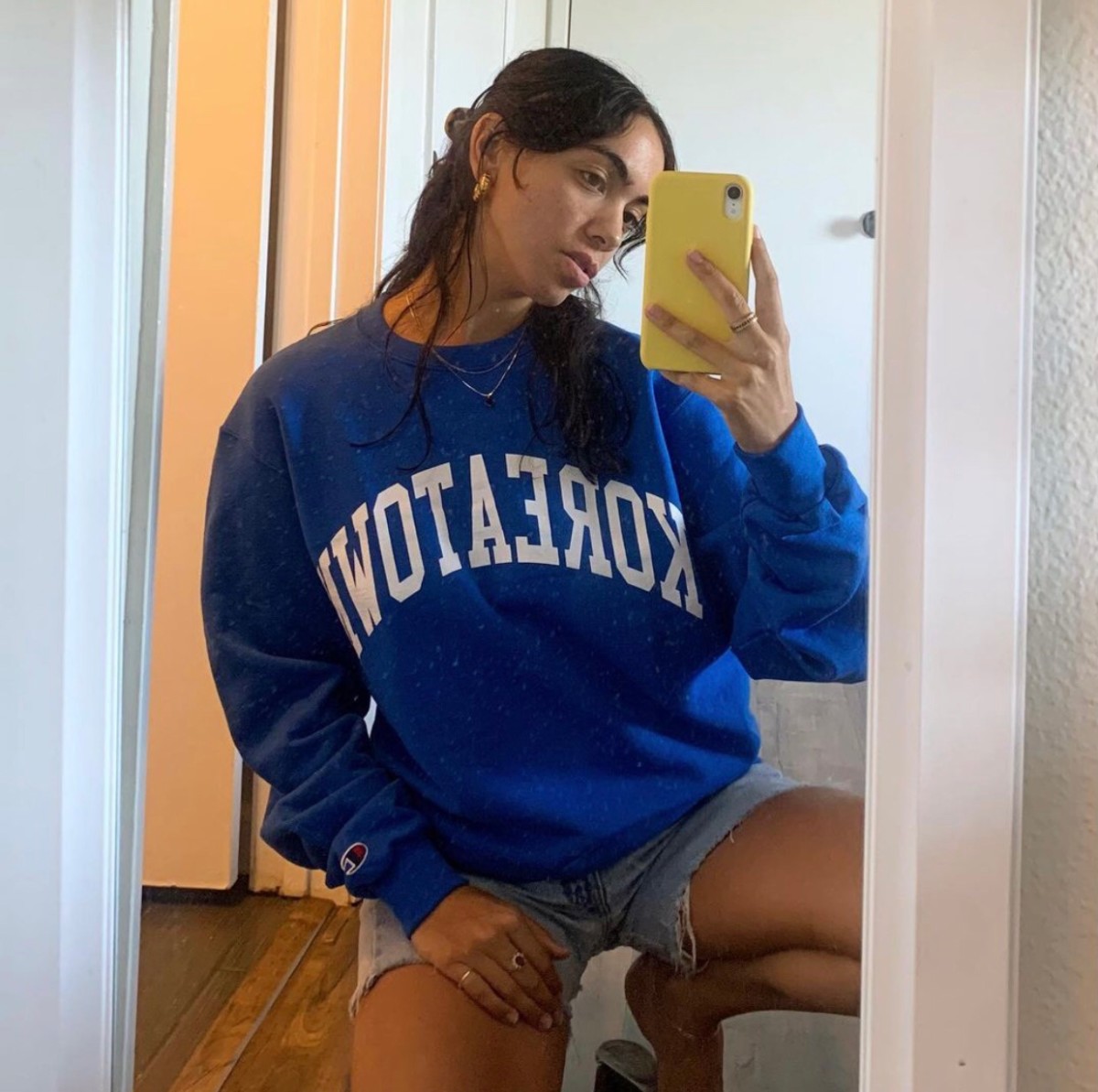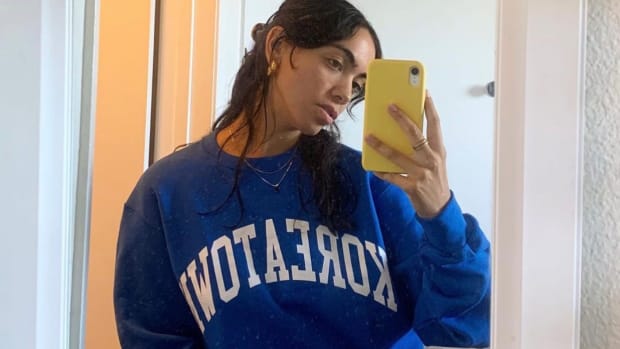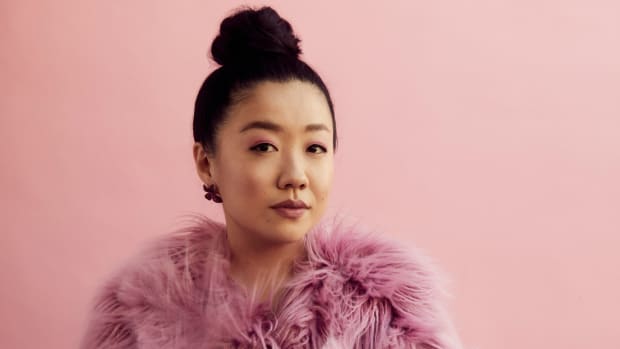The original Koreatown merch.
Photo: Courtesy of Michael Pak
It's a story we've told so many times, it's not even interesting anymore: A big fast-fashion retailer copies a small independent brand; people rightfully get mad at the big retailer, but ultimately nothing is done, because copyright laws fall short when it comes to clothing and the big retailer is too big to fight. Despite all the bad PR companies like Forever 21, Fashion Nova and Shein endure when these copying accusations and ethical shortcomings bubble up on social media and in the press, it continues to happen, and there's almost never so much as an apology.
On July 25, Michael Pak found it had happened to him. The Los Angeles-based entrepreneur and community organizer is not a buzzy fashion designer, but he has been referred to as the "unofficial mayor" of Koreatown, which he presides over via Instagram — he's behind the popular handle, @koreatown — and through local projects he's started, like burger pop-up Love Hour, Koreatown Run Club and Bicycle Meals (which, full disclosure, I'm involved with). That morning, a friend texted a link to a Forever 21 T-shirt that bore a striking resemblance to a line of Koreatown merch Pak started during the pandemic to raise money for organizations that support disenfranchised residents.
Over the phone, Pak admits that his initial reaction was "wow, this is pretty crazy that they do this," followed by: "It's kind of flattering." What made him angry was the fact that there was no purpose behind Forever 21's apparent imitation. Pak alerted his 110K+ Instagram followers. "SUCK MY ASS @forever21 ARE YOU KIDDING ME?!?! TAKE THIS DOWN! SPAM THESE FUCKS!," he captioned the post.
That they did.
The post was shared far and wide. Whatever the @Koreatown equivalent of the Beyhive is took their anger out in Forever 21's Instagram comment section. Diet Prada amplified things further with a post of its own the very next day.
"When Diet Prada posted, I was like, 'Oh man, this is gonna be something big,'" Pak says.
Early in the pandemic, Pak began making sweatshirts emblazoned with "Koreatown" in a collegiate font as a way to represent his adopted neighborhood, but he didn't feel right taking all the profits.
"I've always had this thing of, 'Well, if I make these hoodies, I still feel a certain type of way, since I'm not from L.A.' — like, it would be crazy if I took all the profits and just benefited from this neighborhood that I just moved to," he says. "So in my head I was like, 'Well, you have to give back in some kind of way.'"
The first drop benefited Koreatown Youth & Community Center. (The organization didn't even know until Pak surprised them with a donation.) Things snowballed from there, with Pak raising more money for local nonprofits with each sporadic drop. Meanwhile, the merch was gaining increasing cultural significance and visibility even outside of the Los Angeles neighborhood it celebrated. Bretman Rock, Margaret Cho, Toro Y Moi's Chaz Wick and Pete Wentz have been spotted in the sweatshirts. Pak also did a collaboration with the streetwear brand Carrots.
It's easy to understand Pak's initial reaction of flattery — the merch had become A Thing, so much so that it landed on the radar of Forever 21's design team. But why should Forever 21 profit from it? While the retailer has fielded countless similar accusations, the charitable component of, and integrity behind, the original Koreatown merch made this incident feel all the more unjust. Perhaps that's part of the reason why things unfolded so differently.
After the Diet Prada post, to Pak's surprise, a member of Forever 21's communications team reached out to him via email to apologize and set up a call. Before the call, Pak asked that they take the offending shirts offline and out of stores and consider donating to Koreatown nonprofits.
Recommended Articles
"They were just so apologetic and responsive, and they were really trying to find ways to fix this," Pak says. "I just really had only two goals going into the meeting — 'You took it down online and you're in the process of taking it out of the stores. The other thing I really want you guys to do is: here's five nonprofit organizations in Koreatown. I want you to donate $20K each to each organization, a total of $100,000.' And they didn't even blink an eye. They were very, like, 'Okay, let's do it. We're going to figure it out and we'll get it done.' And that was it."
Credit is due to Pak and his loyal community of supporters for making this happen. Forever 21 has been in hot water like this many times before without such a positive outcome. The most similar situation occurred in 2017, when Forever 21 was accused of copying the design of a T-shirt created to raise money for Planned Parenthood. The online outrage was strong, and while the retailer did end up pulling the shirt from stores, it didn't admit any wrongdoing or publicly announce a donation to Planned Parenthood, as the original designer asked. Aside from pressure from Pak and his supporters, why was Forever 21 so much more proactive this time?
Forever 21 posted a statement to Instagram a few days after the call with Pak, confirming plans to donate its remaining Koreatown shirts to a charity of Pak's choice, and the five organizations it would be giving $20,000 each: APAIT, Koreatown Immigrant Workers Alliance (KIWA), Koreatown Youth & Community Center, the Islamic Center of Southern California and Urban Partners Los Angeles.
"We won't always get things right, but we will do our best to make things right," the statement began. "With 42% of Forever 21's corporate staff identifying as Asian and Pacific Islander, we value diversity and admire the work Mike has done to drive inclusivity."
"They felt strongly about this whole topic and what it meant for them to speak up as Asian-Americans," Pak says of his call with Forever 21.
On the initial Instagram post, many commenters pointed out the hypocrisy of the alleged design theft given that the founders and longtime owners of Forever 21, Do Won and Jin Sook Chang, are Korean immigrants. But the company has since changed hands. After sales plunged, forcing the company to declare bankruptcy in September 2019, the Changs sold it jointly to Authentic Brands Group, Simon Property Group and Brookfield Property Group. ABG now owns Brookfield's shares as well, making it the majority owner.
In July of this year, ABG filed to go public. A jaded person might wonder if that has anything to do with the swiftness with which Forever 21 moved to put out this particular fire. Anytime a company goes public, there's greater pressure for transparency and accountability. At this stage, ABG is likely focused on wooing potential investors by promoting the strength of its assets, like Forever 21. It's not a great time for bad PR.
There's also the possibility that the retailer saw this snafu as an opportunity to assert itself as being in favor of inclusivity, show outward-facing support for its largely-AAPI workforce and give back. We're living in a time when consumers expect more from the companies they shop from. Corporations are under pressure to stand for something and make the world a better place (however unrealistic those expectations may be).
Whatever the underlying reasons for Forever 21's newfound sense of rectitude, Pak is just happy with the outcome.
"I'm just really thankful that they did the right thing and it was honestly the easiest thing. It was so smooth," he says. "And I salute them on their part of just really trying to make everything right." He plans to continue making monthly Koreatown merch drops with proceeds going to local community organizations.
In an industry that often puts profits over people, examples of big companies doing the right thing in these situations are few and far between. The way Gucci invested in Dapper Dan, after appropriating his cultural influence, comes to mind. Here's to hoping that companies continue to find more meaningful ways to respond to these call-outs in the future.
Never miss the latest fashion industry news. Sign up for the Fashionista daily newsletter.





